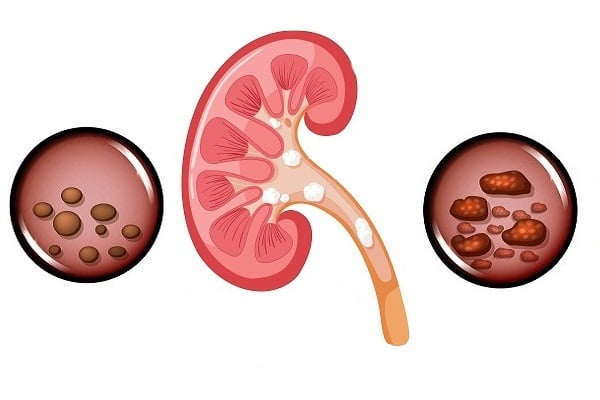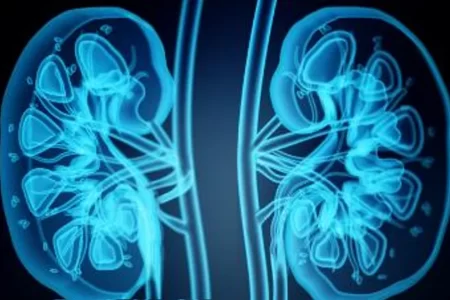What You Should Know About Calcium Kidney Stones?
- Updated on: Feb 29, 2024
- 3 min Read
- Published on Dec 21, 2022

What are kidney stones?
Kidney stones, also known as renal calculi, are small, hard masses made up of crystals that form in the kidneys. These stones can be made up of various substances, but the most common type is calcium and oxalate. Calcium kidney stones are a common type of kidney stone that affects many people.
Kidney stones are formed when the levels of certain substances in the urine become too high. These substances can include calcium, oxalate, and uric acid. When the levels of these substances are too high, they can form crystals in the kidneys. Over time, these crystals can grow and harden into kidney stones.
What are calcium kidney stones and how do they form?
Calcium kidney stones are often formed when the body has too much calcium or not enough oxalate. The calcium and oxalate then combine to form the stones. Calcium kidney stones can also be caused by certain medical conditions, such as hyperparathyroidism, which is a condition in which the parathyroid gland produces too much hormone. This can cause the body to absorb too much calcium from the diet.
Risk factors for developing calcium kidney stones
There are several risk factors for developing calcium kidney stones. These include a family history of kidney stones, a diet high in sodium and animal protein, and being dehydrated. People who take certain medications, such as diuretics or calcium supplements, may also be at a higher risk of developing calcium kidney stones.
Symptoms of calcium kidney stones
Calcium kidney stones can cause a range of symptoms, including:
Severe pain in the back or side: This pain is often described as a sharp, cramping pain that can be constant or come and go. The pain may be more severe when the stones move through the urinary tract.
Pain when urinating: The pain may be a burning sensation or a sharp, stabbing pain.
Blood in the urine: The stones can cause irritation and damage to the urinary tract, leading to blood in the urine.
Frequent urination: The stones may cause the person to feel the need to urinate more often.
Nausea and vomiting: These symptoms may occur if the stones are causing an infection or blockage in the urinary tract.
It is important to see a healthcare provider if you suspect that you have a kidney stone, as treatment may be necessary to relieve the symptoms and prevent complications.
Treatment of calcium kidney stones
Treatment for calcium kidney stones may include medications to help dissolve the stones, or surgery to remove the stones. To prevent calcium kidney stones, it is important to drink plenty of water and to maintain a healthy diet low in sodium and animal protein. It is also important to manage any underlying medical conditions that may increase the risk of developing kidney stones.
Treatment for calcium kidney stones depends on the size and location of the stones, as well as the symptoms the person is experiencing. Smaller stones that are not causing any symptoms may not require treatment, as they may pass on their own.
If the stones are causing symptoms or are larger in size, treatment options may include:
Medications: Certain medications, such as alpha-blockers and calcium channel blockers, can help relax the muscles in the urinary tract and make it easier for the stones to pass.
Extracorporeal shock wave lithotripsy (ESWL): This is a non-invasive procedure in which sound waves are used to break the stones into smaller pieces, which can then be passed through the urine.
Ureteroscopy: This is a procedure in which a thin, flexible tube with a light and camera on the end is inserted into the urinary tract to locate and remove the stones.
Percutaneous nephrolithotomy (PCNL): This is a surgical procedure in which a small incision is made in the back and a scope is inserted through the incision to remove the stones.
Open surgery: In cases where the stones are too large or cannot be removed through other methods, open surgery may be necessary to remove the stones.
It is important to follow the treatment plan recommended by a healthcare provider, as well as take steps to prevent future kidney stones, such as drinking plenty of water and maintaining a healthy diet, etc.
FAQs
Can a calcium-rich diet lead to calcium kidney stones?
Excessive dietary calcium can contribute to stone formation, but it's crucial to balance intake with other factors like hydration and overall diet composition.
Are all calcium kidney stones the same?
There are different types of calcium stones, such as calcium oxalate and calcium phosphate stones. Understanding the specific type is vital for effective treatment.
Can medications contribute to calcium kidney stone formation?
Certain medications, like calcium supplements, may increase the risk of stone formation. Always consult with a healthcare professional to manage medication-related risks.
How can one prevent the recurrence of calcium kidney stones?
Lifestyle changes, adequate hydration, and dietary modifications, including reducing sodium and animal protein intake, can help prevent the recurrence of calcium kidney stones.
Are children at risk of developing calcium kidney stones?
While less common in children, calcium kidney stones can still occur. Monitoring calcium intake, hydration, and addressing genetic factors are crucial in pediatric cases.












